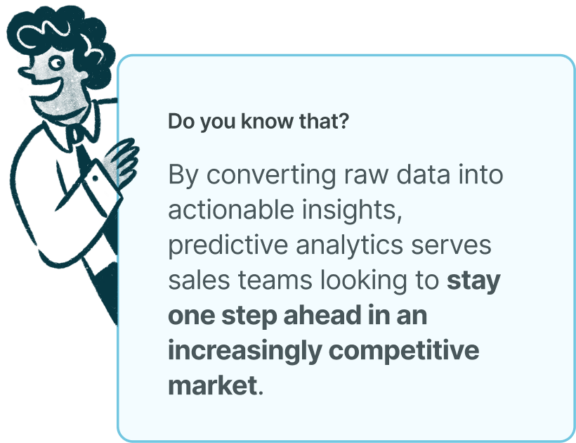AI in Sales: Top 5 Changes in 2024
Sales is undergoing a dynamic transformation, thanks in large part to the integration of AI in sales strategies. In 2023, we witnessed a pivotal shift as artificial intelligence started contributing to every sales team in some way. In 2024, we will see further adoption of AI in sales and start to see how AI contributes to deeply effective sales processes.
AI’s evolution is reshaping how sales teams interact with data, personalize customer experiences, and streamline their workflows. As we delve into this exciting journey, we’ll explore how AI is not just changing the game — it’s redefining it, making the sales role more intuitive, efficient, and impactful than ever before.
Key Highlights
1. Predictive Analytics: A Game-Changer in Sales
AI in sales has become a pivotal force, particularly in the realm of predictive analytics. This sophisticated tech is revolutionizing how sales teams understand customer behavior, anticipate market and sales trends, and make strategic decisions. Let’s dive into the transformative impact of predictive analytics powered by AI.
Understanding Customer Behavior: Deciphering Complex Data Patterns
The key to successful sales lies in understanding customer behavior, and this is where AI truly shines. By analyzing vast and varied data sets, AI helps sales teams decode complex customer behavior patterns. It’s no longer about sifting through endless spreadsheets or guessing customer preferences. AI in sales offers a clear window into what customers really want and need.
- AI can analyze any data that you can: past purchase history, browsing patterns, and engagement levels can all contribute to creating detailed customer profiles.
- This kind of insight is invaluable. Sales teams can now tailor their approach to fit each customer’s unique profile, making interactions more meaningful and effective.
- AI allows you to sell with a clear understanding of each customer’s journey and preferences.
Forecasting Sales Trends: Predicting Market Shifts and Opportunities
Another area where AI is making a significant impact is in forecasting sales trends. The ability of AI to analyze current market data and historical trends results in predicting future market shifts and identifying potential sales opportunities with remarkable accuracy. This predictive power is a game-changer for sales strategies.
Imagine being able to anticipate a surge in demand for a particular product or service before it happens. Sales teams can prepare and capitalize on these opportunities, staying one step ahead of the competition.
Data-Driven Decision Making: Leveraging AI Insights for Strategic Decisions
Finally, AI in sales is revolutionizing data-driven decision making. With AI, sales teams are no longer relying solely on intuition or limited data. Instead, they have access to comprehensive, real-time insights that inform strategic decisions.
AI algorithms can identify patterns and insights that might be missed by the human eye, offering a level of depth and precision in analysis that is unprecedented. This leads to more informed decisions, whether it’s about targeting specific customer segments, adjusting pricing strategies, or developing new products.
Predictive analytics, powered by AI, is transforming the sales landscape. It offers a deeper understanding of customer behavior, accurate forecasting of sales trends, and the ability to make informed, strategic decisions. As AI in sales continues to evolve, it’s clear that the sales teams who embrace this technology will find themselves at the forefront of efficiency and success.

2. Personalization: Redefining Customer Relationships
The essence of effective sales has always been about understanding and connecting with customers. In 2024, this has been revolutionized by the implementation of AI in sales, particularly in the realm of personalization. Let’s explore how AI is redefining the way we tailor customer experiences, enhance engagement, and leverage data for a more personalized approach.
Tailoring Customer Experiences: AI’s Role in Customizing Sales Approaches
Personalization in sales is no longer just about addressing a customer by their first name. It’s about delivering experiences that resonate on a personal level. AI plays a crucial role in this by analyzing customer data to uncover AI insights into preferences, behaviors, and needs. This level of understanding allows sales teams to craft highly customized sales approaches.
For example, AI can identify the types of service a customer is interested in, the best time to contact them, and even the tone and language that would most appeal to them.
Enhancing Customer Engagement: Using AI to Deepen Customer Connections
Engagement is key in sales, and AI is transforming how we connect with customers. Through machine learning and predictive analytics, AI in sales enables a more intuitive and responsive interaction with customers. AI-driven tools can analyze customer interactions in real-time, providing sales representatives with suggestions on how to steer conversations effectively.
AI can automate follow-up communications, ensuring that customers receive timely and relevant information. In this context, AI voice agents can support these interactions by maintaining a natural tone and responding to customer needs in real time. This automation, when used correctly, doesn’t feel robotic or impersonal; rather, it’s about sending the right message at the right time, enhancing the human touch rather than replacing it.
Leveraging Data for Personalization: How AI Utilizes Customer Data
The backbone of AI-driven personalization is data. AI in sales leverages customer data to create highly personalized experiences. This involves not just analyzing past purchases and interactions but also gathering real-time data from various touchpoints. AI systems can integrate and interpret this data to provide a comprehensive view of each customer.
This data-driven approach allows sales teams to customize their messaging, offers, and services to align closely with individual customer needs and preferences. The result is a more efficient sales process with higher conversion rates.

3. Automating the Routine: AI in Everyday Sales Tasks
In 2024, AI in sales isn’t just a futuristic concept; it’s a present-day reality transforming everyday sales tasks. The automation brought by AI is streamlining data management, enhancing productivity, and aiding in sales interactions. Let’s explore how AI is reshaping the routine in sales, making room for more strategic and impactful work.
Streamlining Data Management: AI’s Impact on CRM and Data Handling
One of the most significant impacts of AI in sales is seen in Customer Relationship Management (CRM) and data handling. Gone are the days of manual data entry and sifting through piles of paperwork. AI-powered CRMs are now capable of automating these mundane tasks, from updating customer records to logging sales interactions.
This automation isn’t just a time-saver; it’s a game-changer. With AI handling data management, sales professionals can focus on what they do best – selling.
Enhancing Productivity: How AI Frees Up Time for Strategic Selling
The freeing up of time is perhaps one of the most tangible benefits of AI in sales. By automating routine tasks, AI allows sales teams to dedicate more time to strategic selling. This isn’t just about having more time; it’s about how that time is used.
Sales professionals can now spend their days engaging in meaningful interactions with prospects and clients, crafting customized sales strategies, and focusing on personal development and training. This shift towards more value-added activities not only enhances productivity but also boosts job satisfaction and performance. In my career, witnessing the shift in focus from routine tasks to strategic selling was a testament to AI’s transformative power in sales.
AI-Assisted Sales Interactions: Using AI for Real-Time Assistance and Decision Making
AI in sales is also revolutionizing how sales interactions are conducted. AI tools can provide real-time assistance during customer interactions, offering insights, suggestions, and even handling parts of the communication process.
These AI assistants are not replacing human interaction; they’re enriching it. They provide sales reps with instant access to customer data, previous interactions, and product information, enabling more informed and effective sales conversations. And AI can even analyze customer responses and guide sales reps in real-time, helping them to overcome objections and close deals more effectively.
The automation brought by AI in everyday sales tasks is not just about efficiency; it’s about effectiveness. By streamlining data management, enhancing productivity, and aiding in sales interactions, AI is allowing sales teams to focus on what truly matters – building relationships and driving sales.

Make Sales Smarter with Surfe
The go-to prospecting intelligence tool for sales teams
4. The Future of AI in Sales Training and Development
AI has introduced a new era in sales training and development, characterized by customization, interactive learning, and insightful feedback.
Customized Learning Paths: AI’s Role in Personalized Training and Development
The one-size-fits-all approach to training is becoming obsolete, thanks to AI. With its ability to analyze individual performance data, AI in sales is facilitating personalized learning paths for each sales representative. These customized training programs are tailored to address specific skill gaps and learning preferences, making them much more effective than traditional training methods.
Improving Sales Skills with AI: Using AI Tools for Skill Enhancement and Role-Playing
AI tools are also transforming the way sales skills are developed. Interactive role-playing scenarios powered by AI provide sales reps with realistic and challenging selling situations. This hands-on approach to learning allows them to practice and hone their skills in a safe, controlled environment.
These AI simulations can mimic a variety of sales scenarios, from initial customer interactions to complex negotiation processes. This kind of practical experience is invaluable. It enables sales reps to learn from their mistakes, refine their techniques, and build confidence without the pressure of real-world consequences.
Feedback and Performance Analysis: AI-Driven Insights for Sales Performance Improvement
Finally, the role of AI in providing feedback and analyzing performance cannot be overstated. AI algorithms can assess sales calls, presentations, and customer interactions to provide constructive, data-driven feedback. This feedback is specific, actionable, and timely, making it a potent tool for continuous improvement.
Moreover, AI-driven performance analysis helps identify trends and patterns in sales behaviors that might not be apparent to the human eye. This insight allows sales managers to make informed decisions about coaching and development strategies, leading to better overall team performance.
The integration of AI in sales training and development is transforming how sales professionals learn, grow, and succeed. With customized learning paths, interactive skill-building tools, and insightful performance analysis, AI is equipping sales teams with the knowledge and skills they need to thrive in today’s fast-paced sales environment. As we look to the future, it’s clear that AI will continue to be an invaluable partner in driving sales excellence.
5. Emerging AI Technologies in Sales
Next-Generation AI Tools: Overview of Upcoming AI Technologies in Sales
The horizon of AI in sales is brimming with potential, marked by innovative tools that promise to elevate sales processes to new heights. These include advanced analytics engines capable of predicting customer needs with greater precision and AI-driven virtual assistants that offer more nuanced and context-aware support.
One particularly exciting development is in natural language processing (NLP), which is reaching new levels of sophistication. This means AI tools will not only understand customer queries more accurately but also respond in a manner that’s almost indistinguishable from human interaction. Imagine AI-powered chatbots conducting initial sales conversations, qualifying leads, and even handling objections, all in a seamless and natural way. A great example are tools that are using AI for B2B lead generation.
Integrating AI into Sales Strategies: How New Tools Will Shape Future Sales Tactics
As these advanced AI tools become more mainstream, integrating them into sales strategies will be crucial. The sales teams that harness these technologies effectively will gain a competitive edge. For instance, AI-enabled predictive selling can inform not just whom to target but also when and with what message, creating a sales approach that’s both strategic and personalized.
Another area where AI will have a significant impact is in customer relationship management. By integrating AI into CRM systems, sales teams can expect a more holistic and dynamic view of customer interactions, leading to more informed and timely decision-making.
And the leading CRMs are already implementing AI – we were at HubSpot’s INBOUND conference when they announced HubSpot AI and we also had the pleasure recently of viewing a demo of Salesforce’s latest improvements to their Einstein AI technology.
Staying Ahead of the Curve: Preparing for AI Advancements in the Sales Industry
Staying ahead in the fast-paced world of sales means being proactive about AI advancements. Sales professionals and teams need to be agile, continually updating their skills and knowledge to leverage these new technologies effectively.
Organizations should focus on training and development programs that encompass AI literacy and its practical applications in sales. Fostering a culture that embraces technological innovation will be key to navigating and capitalizing on these changes successfully.
As we look towards the future, it’s evident that AI in sales will continue to be a driving force, introducing groundbreaking tools and strategies. Embracing these advancements and integrating them into sales practices will not only enhance efficiency and effectiveness but also ensure that sales teams remain at the forefront of the industry.

Surfe combines LinkedIn’s networking capabilities with powerful CRM functionalities.
It allows sales teams to manage their prospecting, data entry, and outreach directly within LinkedIn, thereby eliminating the need to spend time switching between multiple tools and platforms.
Let’s wrap it up!
As we’ve explored, the impact of AI in sales in 2024 is both profound and transformative. From predictive analytics and personalized customer experiences to the automation of routine tasks and the emergence of advanced AI technologies, the sales landscape is evolving rapidly.
Embracing these AI-driven changes is no longer optional but a necessity for staying competitive and efficient. As sales professionals, adapting to and leveraging these AI advancements will be crucial in shaping a successful, dynamic future in sales. The journey with AI in sales is just beginning, and its potential to redefine the sales industry is truly boundless.









